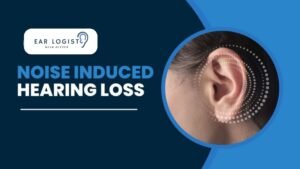Hearing plays a big part in how we connect with others and experience the world. When someone starts losing their ability to hear, it can deeply affect their daily life. The good news is that hearing loss treatment can help people hear better and enjoy their lives again. In this blog, we’ll explain why treating hearing loss is so important, look at the different treatment options available, and talk about how getting treatment early can make a big difference.
What Is Hearing Loss?
Hearing loss is when someone can’t hear sounds as well as they used to, either in one or both ears. It can be mild or severe, depending on how much of their hearing is affected. Hearing loss can happen to anyone, whether they are young or old. There are a few common reasons why people lose their hearing:
- Aging: As people get older, their hearing often gets worse. This is called age-related hearing loss.
- Loud Noises: Being around loud noises for a long time, like music, construction, or traffic, can damage hearing. This type of hearing loss is preventable but very common.
- Genetics: Some people are born with hearing problems or are more likely to develop them because of their genes.
- Infections: Ear infections and other health problems, like meningitis, can damage hearing.
- Injury: Head or ear injuries can also cause hearing loss.
Why Treating Hearing Loss Is Important
Treating hearing loss is important because not doing anything about it can lead to many problems. Hearing loss isn’t just about not being able to hear; it can affect many parts of life. Let’s look at why it’s so important to get treatment:
1. Better Communication
When someone has hearing loss, it’s hard to understand what people are saying, especially in noisy places. This can lead to misunderstandings and frustration. Treating hearing loss helps people communicate better and makes socializing more enjoyable.
2. Protecting the Brain
Hearing loss can make the brain work harder to understand sounds. This extra effort can lead to memory problems or make it harder to focus on tasks. Over time, untreated hearing loss can even increase the chances of developing dementia. Getting hearing loss treatment early helps reduce this strain on the brain.
3. Improving Mental Health
Hearing loss can make people feel alone or depressed because they can’t join in conversations as easily. They may avoid social gatherings and feel isolated. Treating hearing loss can help people regain confidence and feel more connected to others, improving their overall mental health.
4. Boosting Job Performance
For people who are working, hearing loss can make it harder to do their job. They might miss important information during meetings or have trouble communicating with coworkers. Getting treatment for hearing loss allows people to do their job well and avoid misunderstandings.
5. Enhancing Quality of Life
Hearing affects so many parts of our lives. It helps us enjoy music, hear the voices of friends and family, and stay safe by noticing sounds like alarms or car horns. Treating hearing loss helps people enjoy life again by bringing back the sounds they were missing.
Common Hearing Loss Treatments
There are several ways to treat hearing loss, depending on the cause and how bad the hearing loss is. Here are some common treatments for hearing loss:
1. Hearing Aids
Hearing aids are small devices that make sounds louder. They are one of the most common treatments for hearing loss. Hearing aids come in different styles, like ones that sit behind the ear or ones that fit inside the ear canal. A professional can help choose the right type of hearing aid for each person.
2. Cochlear Implants
For people with very bad hearing loss, hearing aids might not be enough. In these cases, cochlear implants may be recommended. A cochlear implant is a device that is put inside the ear during surgery. It helps send sound signals directly to the brain, bypassing the damaged parts of the ear.
3. Bone-Anchored Hearing Systems
Bone-anchored hearing systems use vibrations to help people with hearing loss. This type of system is used for people who have problems with the outer or middle ear. It works by sending sound through the bones of the head to the inner ear.
4. Assistive Listening Devices
These devices can help in specific situations. For example, some people use special systems in classrooms or meetings to make it easier to hear the speaker. Others use amplified telephones to make phone conversations clearer.
5. Surgery
In some cases, hearing loss is caused by a physical problem in the ear, like a hole in the eardrum or a buildup of fluid. In these cases, surgery can help fix the issue and improve hearing.
Why Early Treatment Matters
One of the most important things about hearing loss treatment is getting help as soon as possible. The earlier hearing loss is treated, the better the results will be. Early treatment helps prevent more damage to the hearing and can stop other problems, like mental health issues or memory problems, from getting worse.
1. Newborn Hearing Tests
Many countries now test babies for hearing problems soon after they are born. This helps doctors catch any issues early so that treatment can begin right away. Early treatment is especially important for babies because hearing is key to developing language skills.
2. Regular Hearing Checkups
For adults, especially those over the age of 50, it’s important to get regular hearing checkups. Hearing loss can happen slowly, so people might not notice it right away. Routine tests can catch hearing problems early and make sure treatment starts before the hearing gets worse.
A Holistic Approach to Hearing Loss Treatment
Treating hearing loss isn’t just about fixing the ears; it’s about improving the whole person’s life. This means looking at all the ways hearing loss affects someone, including their mental and emotional well-being.
1. Counseling and Support Groups
Sometimes, people with hearing loss benefit from talking to a counselor or joining a support group. Hearing loss can be frustrating, and it helps to have people to talk to. These groups also teach people coping strategies that make living with hearing loss easier.
2. Family Involvement
Family members play a big role in helping someone with hearing loss. They can support their loved one through treatment and help them adjust to changes. Family members should also learn how to communicate better with someone who has hearing loss, which can improve relationships.
Conclusion
Getting treatment for hearing loss is very important for maintaining a good quality of life. Hearing loss doesn’t just affect the ears; it can impact mental health, relationships, and even job performance. Fortunately, there are many effective treatments available, from hearing aids to implants, that can help people regain their hearing.
Early intervention is key to preventing more problems, so it’s important to seek help as soon as hearing loss is noticed. If you or someone you know is dealing with hearing loss, don’t wait to get treatment. With the right help, people with hearing loss can continue to live full, active lives and enjoy the sounds of the world around them.
Also Read
- What is Fluctuating Hearing Loss?Fluctuating hearing loss means that a person’s hearing ability changes over time. One day, they might hear just fine, and the next day, sounds may seem muffled or distant. These changes can be temporary or happen repeatedly over time. Some
- What Is Hearing Loss Due to Cold?Hearing loss due to cold means your hearing is affected by a cold, either because of the cold weather or a common cold infection. When you have a cold, your nose gets blocked, and that can also affect your ears.
- Cochlear vs Retrocochlear Hearing LossHearing loss affects millions of people worldwide, but it doesn’t always occur for the same reasons or in the same part of the ear. Two common types of hearing loss are cochlear hearing loss and retrocochlear hearing loss. While both
- How to Calculate Hearing Loss PercentageHearing loss can be a complex condition that affects individuals differently. Some people may experience slight difficulty in hearing, while others might suffer from significant impairment. Understanding how to calculate hearing loss percentage is essential, especially for healthcare professionals, insurance
- Noise-Induced Hearing LossNoise-induced hearing loss (NIHL) is a type of hearing loss caused by exposure to loud noises. It happens when the sensitive structures in the inner ear, particularly tiny hair cells, get damaged. These cells are responsible for helping us hear,
Frequently Asked Questions
What are the common causes of hearing loss?
Hearing loss can be caused by aging, exposure to loud noises, ear infections, or injuries. It can also be a result of genetic factors or diseases like meningitis. Sometimes, people experience hearing loss due to a buildup of earwax or fluid in the ear. Regular checkups can help identify and treat hearing problems early.
How can hearing loss impact daily life?
Hearing loss can make communication difficult, leading to frustration in conversations. It may affect relationships, cause isolation, and reduce enjoyment in activities like listening to music or socializing. Untreated hearing loss can also lead to mental health issues, such as anxiety and depression, and may even increase the risk of cognitive decline.
What are the early signs of hearing loss?
Early signs of hearing loss include difficulty understanding conversations, especially in noisy environments, asking others to repeat themselves frequently, and needing to turn up the volume on the TV or phone. People with hearing loss may also experience ringing in the ears (tinnitus) or have trouble hearing high-pitched sounds.
How are hearing aids used to treat hearing loss?
Hearing aids are small devices worn in or behind the ear that amplify sounds to help people with hearing loss. They come in different styles and are customized based on the user’s hearing needs. Modern hearing aids can filter background noise, improve sound clarity, and even connect to smartphones for better functionality in daily life.
Are there surgical treatments for hearing loss?
Yes, surgical options are available for certain types of hearing loss. Cochlear implants, for example, are used for people with severe hearing loss who don’t benefit from hearing aids. Bone-anchored hearing systems are another option for people with middle or outer ear problems. Surgery may also be required to repair ear damage or remove blockages.
Can hearing loss be prevented?
While some types of hearing loss, like age-related or genetic hearing loss, cannot be prevented, many cases can be avoided by protecting your ears. This includes avoiding prolonged exposure to loud sounds, using earplugs in noisy environments, and keeping the volume low when using headphones. Regular ear checkups can also help detect and treat issues early.
How do cochlear implants work for hearing loss?
Cochlear implants are devices that bypass damaged parts of the ear and send sound signals directly to the brain. They are surgically implanted and are mainly used for people with severe or profound hearing loss who do not benefit from hearing aids. Cochlear implants allow users to hear speech and environmental sounds, improving their ability to communicate.
Can children develop hearing loss, and how is it treated?
Yes, children can develop hearing loss due to infections, genetic factors, or birth complications. Early diagnosis is important for their speech and language development. Hearing aids, cochlear implants, or other assistive devices are common treatments. Speech therapy may also be recommended to help children with hearing loss develop communication skills.
How does loud noise cause hearing loss?
Exposure to loud noises over time can damage the tiny hair cells in the inner ear, leading to noise-induced hearing loss. This type of hearing loss can be temporary or permanent. Common sources of harmful noise include loud music, machinery, and power tools. Using hearing protection, like earplugs, can reduce the risk of damage.
What are the mental health effects of hearing loss?
Hearing loss can lead to feelings of isolation, frustration, and loneliness because it makes communication harder. Over time, it may contribute to depression and anxiety. Untreated hearing loss has also been linked to cognitive decline. Seeking treatment early, like hearing aids or counseling, can help improve mental well-being and overall quality of life.








